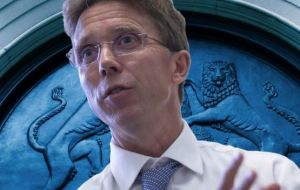MercoPress. South Atlantic News Agency
Bank of England leaves rates unchanged for now, waiting for more Brexit data
 BOE said a majority of officials on its nine-member Monetary Policy Committee agreed to keep the central bank's benchmark interest rate steady at 0.5%
BOE said a majority of officials on its nine-member Monetary Policy Committee agreed to keep the central bank's benchmark interest rate steady at 0.5%  Michael Saunders and Ian McCafferty (Pic) dissented and wanted a modest tightening, arguing it would help keep the path of future interest-rate increases slow, steady
Michael Saunders and Ian McCafferty (Pic) dissented and wanted a modest tightening, arguing it would help keep the path of future interest-rate increases slow, steady  BOE's decision comes as Theresa May meets other European leaders in Brussels, where they are expected to sign off on the terms of a Brexit transition period
BOE's decision comes as Theresa May meets other European leaders in Brussels, where they are expected to sign off on the terms of a Brexit transition period The Bank of England signaled on Thursday that it remains on course to lift interest rates in Britain this year and next, as figures showed a yearlong squeeze on consumers caused by a steep fall in the pound appears to be coming to an end.
The British economy is nevertheless expected to trail its peers in 2018 as uncertainty over Brexit stifles business investment. The government hopes that a deal on a key aspect of withdrawal expected to be formally agreed by European Union leaders in Brussels will help get firms spending again.
The BOE said that a majority of officials on its nine-member Monetary Policy Committee agreed to keep the central bank's benchmark interest rate steady this month at 0.5%.
The panel raised the benchmark rate for the first time in a decade in November and telegraphed that further increases are likely over the next couple of years to keep inflation in check.
Seven of the BOE's nine officials voted to hold off for now, arguing that incoming data on growth and inflation don't yet justify another rise. Two officials, Michael Saunders and Ian McCafferty, dissented, saying that a modest tightening in policy immediately would help officials keep the path of future interest-rate increases slow and steady.
Economists and investors believe the next increase from the BOE could come as soon as May. The U.S. Federal Reserve on Wednesday lifted short-term rates in the U.S. and signaled further increases are expected as the U.S. enjoys a robust expansion.
The BOE's decision comes as Prime Minister Theresa May meets other European leaders in Brussels, where they are expected to sign off on the terms of a transition period to bridge the gap between Britain's EU exit in March 2019 and a final agreement on the terms of the country's future ties to the bloc. The transition period is expected to last until the end of 2020.
Minutes of the BOE's policy meeting underscored how officials believe that greater clarity over Britain's post-EU future would aid the economy, which was among the weakest performers among advanced economies in 2017 despite a rare, synchronized upswing worldwide.
The Organization for Economic Cooperation and Development forecasts annual growth of just 1.3% for the U.K. this year--a much weaker pace of growth than that expected in the U.S., Germany, France and Italy.
“Developments regarding the United Kingdom's withdrawal from the European Union--and in particular the reaction of households, businesses and asset prices to them--remain the most significant influence on, and source of uncertainty about, the economic outlook,” the BOE's rate-setting panel said.
One bright spot: The panel noted that a squeeze on consumers from meager wage growth and high inflation triggered by a steep fall in the pound after 2016's Brexit vote appears to be fading. Annual inflation slowed in February and retail sales rebounded after a poor start to the year, figures showed this week, while wage growth picked up modestly in January.




Top Comments
Disclaimer & comment rules-

Read all commentsThe question is why is this piece appearing in Mercopenguin, a British government propaganda organ supposedly devoted to America, South America and the “South Atlantic”?
Mar 26th, 2018 - 03:19 pm 0Commenting for this story is now closed.
If you have a Facebook account, become a fan and comment on our Facebook Page!